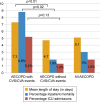Beta-blocker under-use in COPD patients
- PMID: 29089752
- PMCID: PMC5655126
- DOI: 10.2147/COPD.S144333
Beta-blocker under-use in COPD patients
Abstract
Background: Cardiovascular (CVS) comorbidities are common in COPD and contribute significantly to morbidity and mortality, especially following acute exacerbations of COPD (AECOPD). Beta-blockers (BBs) are safe and effective in COPD patients, with demonstrated survival benefit following myocardial infarction. We sought to determine if BBs are under-prescribed in patients hospitalized with AECOPD. We also sought to determine inpatient rates of CVS and cerebrovascular complications, and their impact on patient outcomes.
Methods: Retrospective hospital data was collected over a 12-month period. The medical records of all patients >40 years of age coded with a diagnosis of AECOPD were analyzed. Prevalent use and incident initiation of BBs were assessed. Comorbidities including indications and contraindications for BB use were analyzed.
Results: Of the 366 eligible patients, 156 patients (42.6%) had at least one indication for BB use - of these patients, only 53 (34.0%) were on BB therapy and 61 (39.1%) were not on BB therapy but had no listed contraindication. Prevalent use of BBs at the time of admission in all 366 patients was 19.7%, compared with 45.6%, 39.6% and 45.9% use of anti-platelets, statins and angiotensin-converting enzyme inhibitor/angiotensin II receptor blockers, respectively. CVS and cerebrovascular complications were common in this population (57 patients, 16%) and were associated with longer length of stay (p<0.01) and greater inpatient mortality (p=0.02).
Conclusions: BBs are under-prescribed in COPD patients despite clear indication(s) for their use. Further work is required to explore barriers to BB prescribing in COPD patients.
Keywords: COPD exacerbations; beta-blockers; cardiovascular; comorbidity.
Conflict of interest statement
Disclosure The authors report no conflicts of interest in this work.
Figures


References
-
- World Health Organization Factsheet. Chronic obstructive pulmonary disease (COPD); Fact sheet. Nov, 2016. [Accessed March 23, 2017]. Available at: http://www.who.int/mediacentre/factsheets/fs315/en/
-
- Groenewegen KH, Schols AM, Wouters EF. Mortality and mortality-related factors after hospitalization for acute exacerbation of COPD. Chest. 2003;124(2):459–467. - PubMed
-
- Almagro P, Calbo E, Ochoa de Echagüen A, et al. Mortality after hospitalization for COPD. Chest. 2002;121:1441–1448. - PubMed
-
- Fabbri LM, Luppi F, Beghe B, Rabe KF. Complex chronic comorbidities of COPD. Eur Respir J. 2008;31:204–212. - PubMed
MeSH terms
Substances
LinkOut - more resources
Full Text Sources
Other Literature Sources
Medical

